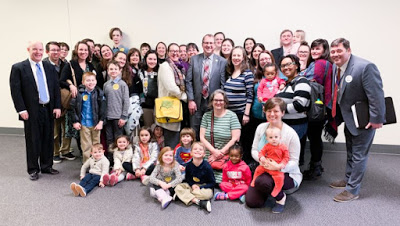Bill to certify Ky. midwives OKd after years of effort, and changes that got doctors and hospitals to end longstanding opposition

Midwives and their advocates gathered for a photo after the March 6 House Licensing, Occupations & Administrative Regulations Committee meeting. (Photo: Mhari Shaw, photojournalism student, Western Kentucky University)
By Melissa Patrick
Kentucky Health News
Loud clapping and shouts of joy filled the state House chamber March 13 when a bill to give certified midwives professional recognition in Kentucky passed after many years of work by lawmakers and advocates.
“This is not a bill about whether or not to allow home births; those are going to happen. This is a bill about making sure families who choose home birth have access to safe and competent care providers,” said Rep. Russell Webber, R-Shepherdsville, who presented Senate Bill 84 in the House.
The bill was the fourth attempt by Sen. Tom Buford, R-Nicholasville, to certify midwives. Several others had tried before him, but until this year they were met with strong opposition from the Kentucky Hospital Association and the doctors’ lobby, the Kentucky Medical Association.
But both those groups, and the American College of Obstetricians and Gynecologists, went neutral on the bill after the House changed this year’s version to require collaboration between midwives and health providers, rules for handling medium- and high-risk births, and an advisory council to recommend regulations to the Kentucky Board of Nursing.
Some of the council’s recommendations will include guidelines for use of medications, ordering of medical tests, and policies for transfer to hospitals when necessary, Webber said.
As the bill went to the House committee, Weber told Kentucky Health News that midwives and consumers had been persistent in their efforts to educate legislators about what they do. “I almost liken this effort to a David versus Goliath situation,” he said.
Rep. Chad McCoy, a Republican lawyer from Bardstown, added an amendment that would assure that no health-care provider would pick up any liability because of a midwife, and that each person involved in the care of a patient would be responsible for his or her own negligence.
Upon final passage of the bill, Sen. John Schickel, R-Union, chair of the Senate Licensing, Occupations and Administrative Regulations Committee, noted that the panel had often heard such bills. He said passage was the result of a long effort that had been contentious at times, though everyone involved continued to work toward the best outcome.
“This is really a historic day I think for health care, for the midwives, for a new day, [and] for the children of Kentucky,” he said.
The changes the House made to the bill even allowed Republican Sen. Ralph Alvarado, a doctor from Winchester, to vote yes, after being one of its loudest opponents in prior years and voting no on the original version.
The bill passed on a vote of 96-1 in the House, with only Rep. Kim King, R-Harrodsburg, voting against it. The Senate concurred with the changes the next day on a 35-1 vote, with only Sen. Stan Humphries, R-Cadiz, voting against it. The original Senate vote on Feb. 21 was 32-4. The bill now moves to Gov. Matt Bevin for his signature or veto.
Buford said when presenting the bill to the Senate in February, “This is a personal choice made by these families for various reasons. We must ensure the families who choose this option have access to quality care through … the licensing of midwives.”
As it stands, Kentucky has no rules or regulations for midwives. When presenting the bill on March 6 in the House committee, Buford said, “Believe it or not, I could be a midwife today, and I know nothing about it.”
Mary Katherine DeLodder, a leader of the Kentucky Home Birth Coalition, told the committee that the bill is about legitimizing midwifery, since right now you don’t know what you are getting when you hire a midwife and communications about them are typically shared via social media. “It’s like you have to know the secret handshake sometimes to find your midwife,” she said.
She said Kentucky has about 700 home deliveries a year, and 33 states already have certified professional midwife programs. A letter on the coalition’s website about the bill’s passage says Kentucky has about 20 certified professional midwives.
Elizabeth Regan, president of the Kentucky Chapter of National Association of Certified Professional Midwives, told Kentucky Health News that SB 84 was about access to midwifery care: “This is what we know makes home births safe, integration into the larger health care system and building collaborative relationships.”